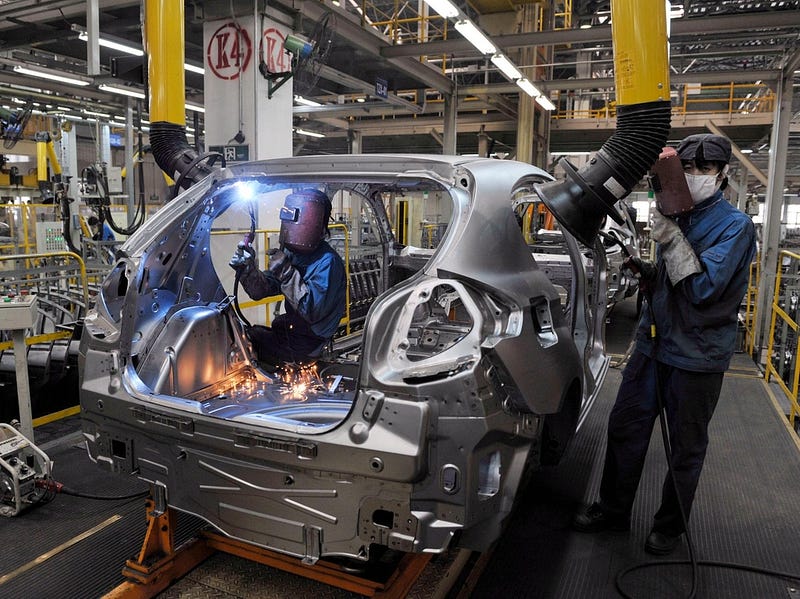Let’s face it, an economic slowdown is probably good for climate change.
Last week Sir Ian Boyd, the UK government’s chief environmental scientist, called for a complete change in how the country measures economic growth. If it’s by gross domestic product (GDP), he said, rather than metrics such as environmental security and a relatively stable climate, it simply encourages the mindset of consumption. “The way we live our lives is generally not good for the environment. We like to consume things but the more we consume, the more we absorb the resources of the planet.”
In so doing, we generate waste, with all our polluting activities contributing to climate change.
There is something in the diagnosis, which isn’t particularly new but bears repeating, if only to drive the point home. For some years, ecologists and economists alike have questioned the very principle of pursuing growth as an economic model. Just like Sir Ian, Federico Demaria, an expert on ecological economics at the Autonomous University of Barcelona, has spoken out about modern capitalism’s fixation on growth. GDP is not an accurate indicator of progress, he said, as it merely leads to an increase in material and energy usage. He called instead for “degrowth, the hypothesis that we can live well, with less”.
In June, C40 Cities, a network of nearly 100 of the world’s biggest cities, released a report that focused on their 700 million inhabitants’ consumption habits. It said the appetite for goods and services, “including food, clothing, aviation, electronics, construction and vehicles”, is responsible for 10 per cent of global greenhouse gas emissions. In August last year, a scientific report commissioned by the United Nations put the case very starkly: “Economies have used up the capacity of planetary ecosystems to handle the waste generated by energy and material use.”

The idea of permanent and rising economic growth is unsustainable
What this means is pretty clear. The so-called “hedonic treadmill” promotes buying stuff but rising demand for travel, electronics, entertainment, food and all manner of baubles big and small is a problem. Consumerism has expanded the world economy, made individual countries richer and improved their people’s standard of living. But consumption uses resources and generates waste. The idea of permanent and rising economic growth is unsustainable. And it is not possible, however hard we try, to decouple consumerism from environmental and societal costs.
By that token, is the predicted global economic slowdown such a bad thing? It’s been a couple of weeks since all the signs started to point to a serious downturn. China has reported the weakest growth in industrial output since 2002.
The German economy, Europe’s largest, shrank as exports slumped. In the Eurozone, trade performance is faltering and industrial production has plummeted lower than at any point in more than three years. Meanwhile the US and UK bond markets have flashed their biggest recession warnings since the 2008 global financial crisis. For now, economists are warning that multiple trade spats set off by US president Donald Trump and a slew of geopolitical crises are coalescing to hit growth.
The world economy, they say, faces its weakest expansion since the financial crisis.
What does this really mean in terms of consumption? Not much, in the short term. Just days ago, government data from the US, the world’s largest consumer market, showed the strongest growth in consumer spending in nearly five years. Americans still seem willing to open their wallets for health and beauty care, as well as restaurant meals, snacks, fancy bottled water and leisure travel. But they don’t seem that keen any more on big-ticket items such as new cars, which is why auto manufacturers are reducing capacity and cutting tens of thousands of jobs.
Best Buy, the multinational that is America’s largest speciality retailer of consumer electronics, has lowered its revenue forecast for the year on the expectation of falling sales of televisions and smartwatches hit by Trump’s 15 per cent tariffs. Some US clothing retailers also said they expect lower sales on account of the tariffs, which went into effect on Sunday. Overall, the University of Michigan’s assessment of US consumer confidence showed an 8.7 per cent fall in August, its largest monthly decline since 2012.
All of which suggests a coming recession that would mean less consumption. This is all to the good, if you go by a theory newly being pushed by some that the trade war might be the Trump administration’s most environmentally friendly policy yet. As economics Nobel laureate Robert Shiller recently pointed out: “During a recession, people pull back and reassess their views. Consumers spend less, avoiding purchases that can be postponed: a new car, home renovations, and expensive vacations.”
Quite. Even so, it’s unsustainable to rely on a recession to prevent environmentally costly consumption. The world’s economic model itself needs to be rejigged. How is this to happen when mainstream politicians everywhere routinely seek election on the promise of more growth and increased disposable income?
Britain’s Sir Ian suggests a three-pronged strategy, comprising greater political honesty, higher taxes on consumption and the use of modern technology. This is an excellent plan. Digital communications would reduce the need for travel and 3D printing would replace the need to ship products all over the world. Tax policy would be reformed to reward low-carbon lifestyles and nudge consumers towards frugal behaviour. Crucially, politicians would sell alternative growth strategies such as the circular economy, which relentlessly recycles.
Can this really come to pass? The growing popularity of city allotments to grow food — in Germany and the UK — and rooftop urban agriculture — in Belgium, France and parts of the US — indicates a new appreciation among millennials for sustainable consumption.
A recession won’t be enough to enshrine the trend. That will require a shift in economic paradigms, political truth-telling and far-sighted policymaking.


